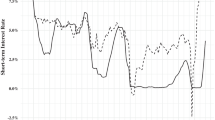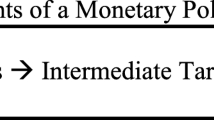Abstract
This article studies the connection between political instability and the sustainability of an exchange rate regime. A model based on the credibility of monetary policy shows that political unrest should be correlated with the adoption of flexible exchange rates. That intuition is tested using various measures of political instability on a panel of 125 countries between 1980 and 1994.
Similar content being viewed by others
References
Alesina, Alberto (1987) “Macroeconomic Policy in a Two Party System as a Repeated Game.” Quarterly Journal of Economics 102: 651–677.
Alesina, Alberto and Vittorio Grilli (1993) “On the Feasibility of a One-Speed or Multispeed European Monetary Union.” Economics and Politics 5: 145–165.
Andersen, Torben M. (1998) “Shocks and the Viability of a Fixed Exchange Rate Commitment.” Open Economies Review 9: 139–156.
Barro, Robert and David Gordon (1983) “Rules, Discretion and Reputation in a Model of Monetary Policy.” Journal of Monetary Economics 12: 101–122.
Bernhard, William and David Leblang (1999) “Democratic Institutions and Exchange Rate Commitments.” International Organization 53: 71–97.
— (2000) “The Politics of Speculative Attacks in Industrial Democracies.” International Organization 54: 291–324.
Collins, Susan M. and Francesco Giavazzi (1993) “Attitudes Toward Inflation and the Viability of Fixed Exchange Rates: Evidence from the EMS.” In Michael D. Bordo and Barry Eichengreen (eds.), A Retrospective on the Bretton Woods System. Chicago: NBER, University of Chicago Press, 547–577.
Edwards, Sebastian (1996) “'Exchange Rates and the Political Economy of Macroeconomic Discipline.” American Economic Review 86: 159–163.
Edwards, Sebastian and Julio A. Santaella (1993) “Devaluation Controversy in the Developing Countries: Lessons from the Bretton Woods Era.” In Michael D. Bordo and Barry Eichengreen (eds.), A Retrospective on the Bretton Woods System. Chicago: NBER, University of Chicago Press, 405–460.
Eichengreen, Barry, Andrew K. Rose, and Charles Wyplosz (1995) “Exchange Rate Mayhem: The Antecedents and Aftermath of Speculative Attacks.” Economic Policy 21: 249–312.
Einzig, Paul (1968) Foreign Exchange-Crises: An Essay in Economic Pathology. London: MacMillan.
Frieden, Jeffry A. (1991) “Invested Interests: The Politics of National Economic Policies in a World of Global Finance.” International Organization 47: 1–39.
Hefeker, Carsten (1997) Interest Groups and Monetary Integration, the Political Economy of Exchange Rate Regime Choice. Boulder: Westview Press.
Hibbs, Douglas A. (1977) “Political Parties and Macroeconomic Policy.” American Political Science Review 71: 1467–1487.
Honkapohja, Seppo and Pentti Pikkarainen (1994) “Country Characteristics and the Choice of the Exchange Rate Regime: Are Mini-Skirts Followed by Maxis?” In Johnny Åkerholm and Alberto Giovannini (eds.), Exchange Rate Policy in the Nordic Countries. Cambridge: Cambridge, University Press, 31–53.
Kaminski, Graciela, Saul Lizondo, and Carmen M. Reinhart (1998) “Leading Indicators of Currency Crises.” IMF Staff Papers 45: 1–48.
Klein, Michael W. and Nancy P. Marion (1997) “Explaining the Duration of Exchange-Rate Pegs.” Journal of Development Economics 54: 387–404.
Lohmann, Susanne (1998) “Rationalizing the Political Business Cycle: A Workhorse Model.” Economics and Politics 10: 1–17.
Melvin, Michael (1985) “The Choice of an Exchange Rate System and Macroeconomic Stability.” Journal of Money Credit and Banking 17: 467–478.
Méon, Pierre-Guillaume (1997) “Credibility of Fixed Parities When the Life-Expectancy of Policymakers is curtailed by Political Uncertainty.” In Christian Hipp et al. (eds.), Geld, Finanzwirtschaft, Banken und Versicherungen 1996. Karlsruhe: Verlag Versicherungswirtschaft, 287–306.
— (2001) “A Model of Exchange Rate Crises with Partisan Governments.” Journal of Macroeconomics 23, forthcoming.
Milesi-Ferretti, Gian Maria (1996) “The Disadvantage of Tying Their Hands: On the Political Economy of Policy Commitments.” Economic Journal 105: 1381–1402.
Milesi-Ferretti, Gian Maria and Assaf Razin (1996) “Current-account Sustainability.” Princeton Studies in International Finance 81.
Nordhaus, William D. (1975) “The Political Business Cycle.” Review of Economic Studies 42: 169–190.
Obstfeld, Maurice (1995) “The Logic of Currency Crises.” In Barry Eichengreen, Jeffry A. Frieden and Jurgen von Hagen (eds.), Monetary and Fiscal Policy in an Integrated Europe. Berlin: Springer, 62–90.
Ozkan, F. Gulcin and Alan Sutherland (1998) “A Currency Crisis Model with an Optimizing Policymaker.” Journal of International Economics 44: 339–364.
Rizzo, Jean-Marc (1998) “The Economic Determinants of the Choice of an Exchange Rate Regime: A Probit Analysis.” Economics Letters 59: 283–287.
Ruland L.J. and Jean-Marie Viaene (1993) “The Political Choice of the Exchange Rate Regime.” Economics and Politics 5: 271–284.
Savvides, Andreas (1990) “Real Exchange Rate Variability and the Choice Of Exchange Rate Regime by Developing Countries.” Journal of International Money and Finance 9: 440–454.
Stein, Ernesto H. and Jorge M. Streb (1998) “Political Stabilisation Cycles in High-Inflation Economies.” Journal of Development Economics 56: 159–180.
Author information
Authors and Affiliations
Rights and permissions
About this article
Cite this article
Méon, PG., Rizzo, JM. The Viability of Fixed Exchange Rate Commitments: Does Politics Matter? A Theoretical and Empirical Investigation. Open Economies Review 13, 111–132 (2002). https://doi.org/10.1023/A:1013916013825
Issue Date:
DOI: https://doi.org/10.1023/A:1013916013825




